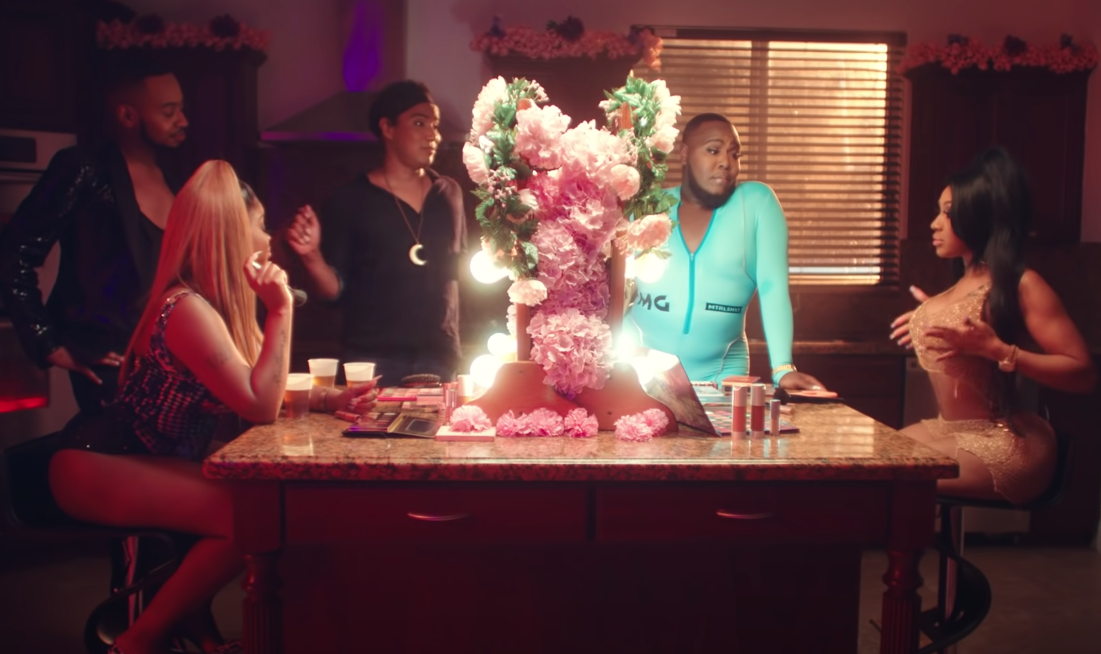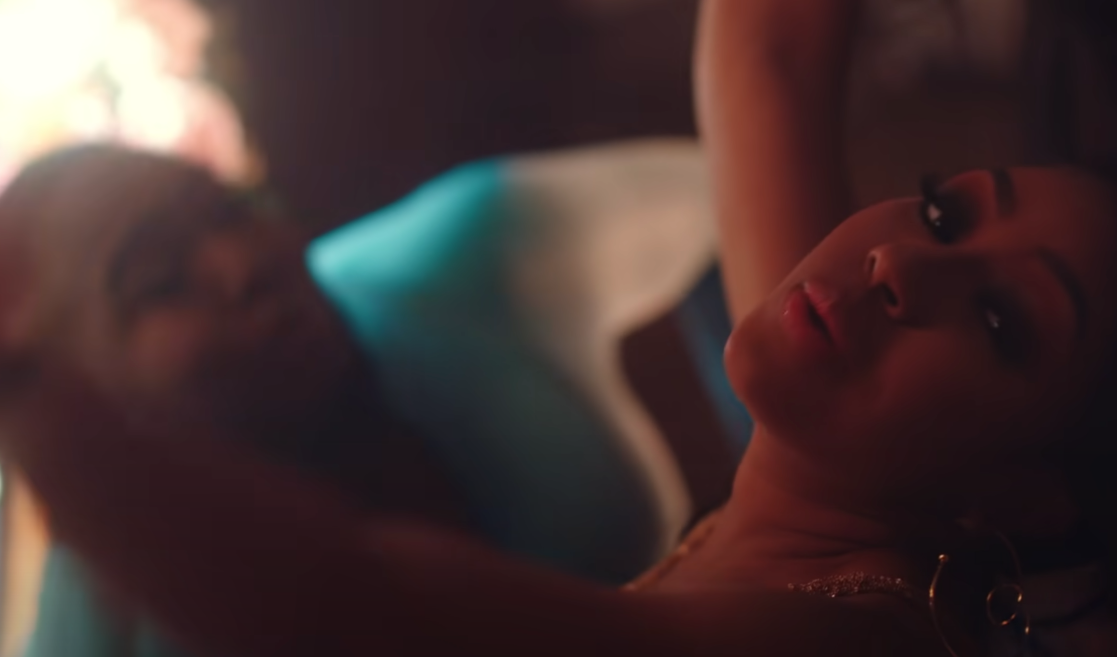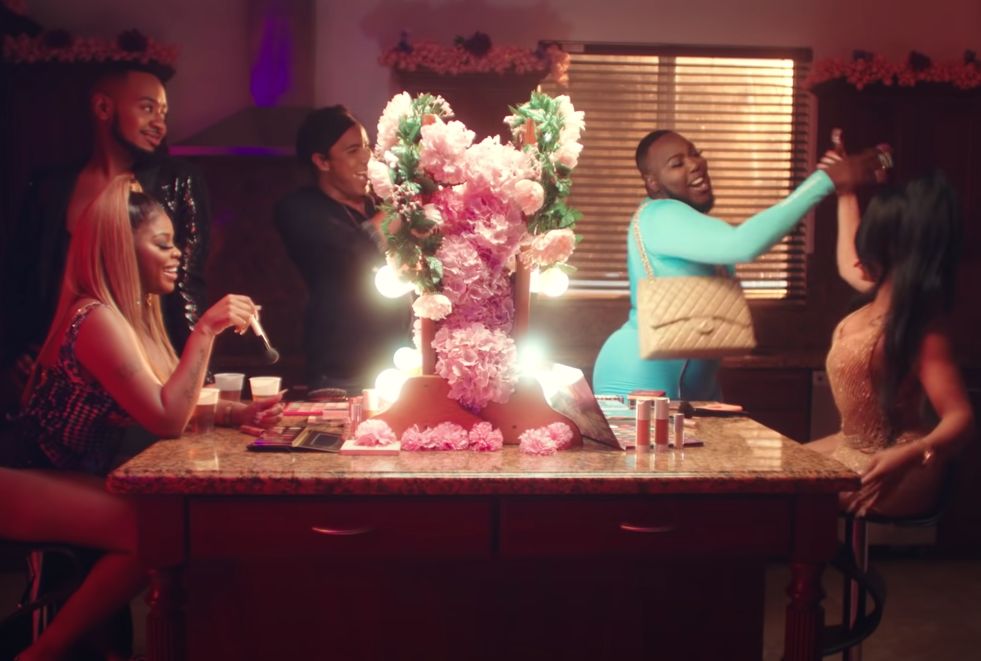"Y'all don't work jobs. Bitch, y'all is a job": Deconstructing Friendship and Labor with the City Girls
by William H. Mosley, III
Published June 2022
Abstract:
This article explores the discourses of friendship and friendship’s deviant formations cultivated between Black women and Black queer men as represented in the music video “Jobs” by City Girls. Paradigms of friendship situate this relationship as a privileged space that historically relies on Western notions of fraternity, justice, and virtue. Decontructionist critique of authentic friendship argues for the prioritization of ideals of sensitivity, love, and compassion, and the valuation of friendship not on the basis of shared past experiences but the promise of a future together. At the same time, Black feminist theories of deviance and the illicit make clear how a dependence upon such ideals without first examining them for the ways they privilege hegemonic affects, judgments, etc., can invisibilize and pathologize minority knowledge, intentions, behaviors, and values. The “Jobs” music video dramatizes the complicated friendships developed between Black women and queer men in which femininity, sexuality, and labor are not strictly relegated to women, the domestic, or the public sphere. Through friendships with Black queer men, straight Black women are supported, celebrated, and witnessed in ways normative society would deem pathological. Using the space of a hip-hop music video to practice friendship that centers Black women and queer men, “Jobs” by City Girls forwards a deviant representation of friendship that imagines a future in which femininity, gender, and sexuality can account for a wider range of practices and performances.
Keywords: friendship, Black Feminism, Black Queer Men, deconstruction, hiphop, sex work
In a playful turn of phrase Saucy Santana transforms the City Girls as laborers (“work jobs”) into labor itself (“y’all is a job”), upholding a relationship between Black women, labor, and sexuality that is not without complication. At the same time, homophobic comments made by the City Girls were not protested by their Black gay confidants. Mainstream Black feminist thought would consider the substitution of a Black woman for her labors the sign of her oppression, just as anti-gay statements can be commonly understood as a lack of safety for LGBTQ+ people. However, the sex work of the City Girls and queerness of Santana unmoors their camaraderie from normative standards of relation. Here Black women sex workers and “butch queens” engage methods that both confirm and exceed the poststructuralist critique of sexism, what Jacques Derrida called the “double exclusion of the feminine,” through the willful embodiment of hyper femininity for the purposes of economic advancement (Bailey; Derrida [1997] 281). Further, despite mutual political antagonism their confidence in each other transcends what is commonly signified by homophobia, whorephobia, and proper friendship. In what follows, I use Black feminist theories of deviance and a poststructuralist critique of logical binaries to read the music video for “Jobs” and anti-gay statements by the City Girls to explore how Black women befriend queer men through configurations that center unconventional approaches to friendship.
In the music video for “Jobs” the City Girls (comprised of Jatavia “JT” Shakara Johnson and Caresha “Yung Miami” Brownlee) play unemployed fast-food workers who turn to sex work after confiding in Saucy Santana, a feminine Black male friend, who offers emotional support and professional guidance. As Yung Miami twerks, Santana playfully cups her buttocks while another butch queen works as a cameraman and hairdresser. This scene stands out in light of recent incidents of Black celebrities spouting homophobic comments, including the City Girls. Similarly hateful statements made by DaBaby, Boosie Badazz, Young Thug, etc. were derided by gay activists and led to efforts to “cancel” rappers who openly disparaged homosexuality or mocked darker skinned Black people. In 2018, homophobic tweets by Yung Miami resurfaced in which she stated she would “beat” her toddler if he were gay (Daw). Critics and gay rights activists rightly condemned her for threatening to abuse a child, but even in her apology, the rapper unabashedly claimed “[she] was just talking about [her] son,” that if she “saw anything gay in [her] son, that [she] would beat him” (Arceneaux). In other news, JT was chastised for espousing colorist ideology on Twitter despite being a darker-skinned woman herself (Rogers).
For Santana, who is femme, gay, and dark-skinned, and who narrowly survived a drive-by shooting which was allegedly motivated by anti-gay hatred, threats against darker skin and gay sexuality are literally matters of life and death (TMZ). And yet, Santana has publicly defended the City Girls’ behavior and, in 2019, participated in the “Jobs” music video as the prototypical gay best friend. But Santana’s status as “friend” to these women is also worth querying. On the one hand, the title quote of this article holds some ambiguous logic and can be read as disparaging Black women as labor (and as bitches). On the other, and more to Santana’s point, he unironically offers this as a word of encouragement to his friends engaged in forms of labor, such as sex work, that dominant culture deems illicit. This begs the question, how is the phrase “bitch, y’all is a job” operating in the context of friendship, homophobia, and sexism? And, to echo poststructuralist thinker and writer Jacques Derrida, “What is friendship? How or what is it? What is a friend? Is friendship said in one sense or in several” (Derrida [1997] 9)? In what sense, we might ask, does “bitch, y’all is a job” signify as a marker of friendship between Santana and City Girls?
Popular music of the twenty-first century is enriched by a bevy of different bodies, politics, and styles that reflect a changing socio-cultural climate for the music industry. Across the multiple genres that comprise popular music, contributions by Black women and queer artists in the form of fashion, hip-hop instrumentation, and rap lyrics have not been as celebrated as the contributions of their cisgender, heterosexual male counterparts. However, the recent commercial success of Black, urban, Southern, feminine, and female entertainers challenges assumptions of what is signified by the terms “popular,” “hip hop,” and “artist.” Though beyond the scope of this article, the achievements of Nicki Minaj and Lil’ Nas X emphasize that the discussion of sexism and homophobia do not bar Black women and queer entertainers from reaching the greatest heights of the music industry. Rather, these incredibly lucrative musicians reveal how sexism, queerphobia, and racism can commingle, however peculiarly, at the site of global capital. To this end, the accomplishments of Black women and openly queer performers in popular music mark the field as an exemplary space for queer-inclusive, critical race, deconstructionist analysis, one in which deviation does not mean abnormal or failure.
This article contends with binaries of straight/queer, friend/foe, allyship/homophobia, domestic/public, work/play, etc. within a tradition of Black feminist poststructuralist thought which takes a nuanced approach to capital’s relation to anti-Blackness, gender, and sexuality (Chakravartty and Ferreira Da Silva; Holland; Spillers; Weheliye). Homing in on this moment in popular music through the concepts of friendship and labor, I argue that the advent of a queer-friendly Black female double act like the City Girls hinges on their ability to communicate a mode of relation which approximates a poststructuralist and Black feminist investment in the perfectly imperfect—in the free play of language, the centralization of margins, and in the compassion they show for the deviance that is embodied by their friends.
Deviance, Female Hip-Hop, and Sexual Cultures
During the 2000s and 2010s, the number of female hip-hop acts increased quite dramatically and, with them, novel configurations of femininity, masculinity, gender, and sexuality would become mainstays in the cultural landscape of pop music. Popular music genres across the charts may have been invented by men and women of color, but these very same groups were historically relegated to the margins of the industry and the underground. Since the 2010s and into the 2020s, female rappers have topped the charts across many Billboard categories, infiltrating pop music and blurring the lines between genres, expanding sexual and gender politics represented in music along the way.
Black women artists including Janelle Monae (“Pynk”), Megan Thee Stallion (“Don’t Stop”), Azealia Banks (“1991”), CupcakKe (“CupcakKe–LGBT”), BbyMutha (“Rules”), and City Girls (“Jobs”) embody what Cathy J. Cohen theorizes as “the potential of counter normative behaviors and oppositional politics” (37) in popular music. By nature of being Black women who lay claim to their own sexuality in public view and in popular music, these exemplary artists are too often subjected to derisive comments, chastised by moralists with a penchant for representations of womanhood and sexuality that prioritize dissemblance, domesticity, and monogamy. While many of these acts embody a sexual-gender politic that is heterosexual and cisgender, the City Girls also incorporate queer sexualities and gender identities in the form of background dancers, video extras, and friends. And where these representations of queerness may further entrench critiques of female hip-hop into discourses of pathology, radical Black feminism allows us to read this maneuver generously. As Cohen makes plain in “Deviance as Resistance”:
Using a theoretical framework closely associated with the commitments of Black feminists, queer theorists, and students of Black politics, where the counter normative behavior and marginal position of different segments of Black communities are highlighted, not with an eye toward pathologizing or even justifying such behavior, but instead with an eye toward recognizing and understanding its possible subversive potential, we can reorient our respective fields to focus on the potential libratory aspects of deviance (38).
In the context of Black popular music, binary opposites such as madonna/whore, classy/ratchet, educated/uneducated, and rich/poor inform how Black cultural studies scholars, thinkers, and students may interpret representations of queerness and female sexuality as a moral failing of that particular artist. Cohen’s groundbreaking work situates deviance as a political strategy and works against a history of researchers “categoriz[ing] what they perceived as more severe indicators of destructive behaviors and characteristics found in poor urban communities” (35). In order to redress the damning effects of this intellectual tradition, Cohen righteously argues for “a new focus on the relationship between deviant practice, discourse, and politics” (37). This is not to substitute one side of the binary for the other, wherein normal/deviant, acquiesce/resist, agree/defy are flipped. To do so would merely replace one system based on hierarchy, power, and oppression with another. Rather, in the face of racial and sexual discrimination, Black women and queers garner a sense of autonomy by the playful occupation and disregard of what is signified by language typically used to oppress. Thus, the practice of defiance, resistance, and deviance by Black women and their confidants are influential and ought to be accounted for. With regard to “Jobs” by City Girls, nearly every “other” or right side of the binary opposites is at play, implicating not just the visibly queer extras, but JT and Yung Miami as well. In occupying this racialized, gendered, and damned locus, Hortense Spillers in “Mama’s Baby, Papa’s Maybe: An American Grammar Book” argues that the history of stereotypes ordering Black women in the national imaginary is precisely the effect of such rhetorical and symbolic confinements: “Let’s face it. I am a marked woman, but not everybody knows my name. ‘Peaches’ and ‘Brown Sugar,’ ‘Sapphire’…I describe a locus of confounded identities, a meeting ground of investments and privations in the national treasury of rhetorical wealth” (Spillers 65). These archetypes notwithstanding, the City Girls have made a figurative (in the music video) and literal (because of their music) fortune while embracing the “Sapphire” within. Against the conditions that order life in an economy, industry, and world that is anti-Black, in which the body and flesh of Black women are the text that can be endlessly, ruthlessly reconfigured for and by white supremacy, the City Girls choose the illicit, the uninhibited, and, to paraphrase Spillers, the power of the female within with a sense of play, shamelessness, and unapologetic sexual autonomy.
In A Taste for Brown Sugar Black feminist scholar Mireille Miller-Young theorizes the existence, manipulation, and subversion of stereotypes in the narratives of sex workers as the practice of “illicit eroticism.” Specifically applying to Black women and queer people of color, illicit eroticism manifests as the “negotiat[ion of] a phobic majoritarian public sphere that continuously elides or punishes the existence of subjects who do not conform to the phantasm of normative citizenship” (Miller-Young 22). In the music video for “Jobs,” Santana offers the sage wisdom of illicit eroticism through the exercise of what Miller-Young terms “erotic sovereignty,” or the practice of “self-rule, collective affiliation, [and] intimacy” (16). Through erotic sovereignty, City Girls can self-govern desire and subjectivity not despite, but because of Black female pornographic sexuality (16). In other words, the difference between working a job and being a job is the ability of Black women to call the shots of how and to what end their sexuality is leveraged.
The City Girls’ transformation from unemployed fast-food workers into successful sex workers is facilitated by the support of their queer friends who understand the role femininity plays in the libidinal economy and flow of capital. This is not to say the City Girls are simply guided into a life of sex work by men. Rather, the overt queerness and femme aesthetic of their male friends collapse, invert, and plays with binaries of male/female, bourgeoisie/proletariat, and “work jobs”/“is a job” as neither the City Girls nor Santana can lay claim to a pure connection of economic, social, or cultural freedom associated with their white, cisgender, male, or middle-class counterparts. By claiming the City Girls “don’t work jobs. Bitch, y’all is a job,” Santana pushes his Black girlfriends to mobilize illicit eroticism that is inscribed onto Black female sexuality, regardless if they capitalize on it or not. It is through the support of queer friendships that these Black women come into their own erotic sovereignty, and they celebrate that in the form of a song and music video with their friend, Santana.

Cohen argues that theorizing deviance “should lead to the inclusion of previously silenced and absent members of our communities” with a focus on “the poor, women, lesbians and gays—those people on the margins of society and excluded from the middle-class march toward respectability” (Cohen 42). In this microcosm of Black community created between heterosexual women and queer men, a genre of friendship is sustained on tenants rarely represented in popular music, in discourses of femininity, or studies of friendship. In representing both gender-non-conforming men and cisgender women as collaborators in a grand scheme to extract money from men, the music video “Jobs” demonstrates how the labor of friendship outside of respectable, normative, middle-class standards can subvert prejudices. Working against the City Girls and Santana are their personal histories of problematic behaviors that do not work in their favor. But it should not be the case that Black women or queer men, outside of the racial, gender, and sexual identities they cannot change, need to be perfect models of respectability or political correctness in order to be studied using the best of Black feminist and poststructuralist critique.
Friendship, Bitches, and Other Texts
Historically, Western discourses on friendship have relied on oppositions of space, gender, race, value, and power that distinguish this particular kind of relationship between men. According to treatises on friendship since antiquity, appropriate friendships ought to embody the left of binary oppositions such as singular/universal, private/public, men/women and, I would add, masculine/feminine, heterosexual/queer, and free/commercial. Valorization of hegemonic standards of friendship and its constitutive gender, sexuality, and racial norms are embedded not only in its phenomenology but manifest in displays of proper friendship in media and popular culture. One side effect of this is the “double exclusion of the feminine in the philosophical paradigm of friendship” (Derrida 642). While those who fit neatly into narrow definitions of what it means to be a friend have little to worry about, communities who value altogether deviant, defiant, or resistant qualities are not afforded the same privileges. Following Black feminist interventions of discourses on deviance with Derrida’s writings on friendship, I am less interested in the expansion or critique of what can be considered friendship as these notions historically mismanage deviations from the norm. Instead, I wonder if and how poststructuralist criticism of language, text, and the phenomenology of friendship beats to the same drum as Black feminist criticisms of respectability, labor, and propriety.
“O my friend, there is no friend.” It is in this singular and highly contested quote attributed to Aristotle by the renaissance philosopher Michele de Montaigne where Derrida plumbs the problem of the Western concept of friendship. The quote begins with an apostrophe to “my friends” but is paired with a perplexing statement, that “no friend” exists or is there to receive him, the apostrophe, or his sentiment. But embedded within “this performative contradiction,” Derrida argues “there must indeed be friends in order for me [the speaker] to address them in this way, if only so as to say to them ‘there is no friend’” (Derrida [1997] 27; Derrida [1993] 635-7). Using Aristotle’s work on the act and meaning of prayer which, like friendship, can take the form of an apostrophe without the promise of a witness, Derrida postulates that friendship, and not the “friend” necessarily, is created by way of promises to be kept, or in the practice of maintaining bonds between so-called friends:
The apostrophe, whose form surpasses and compromises itself in the alleged determination of fact, resembles at one and the same time an act of recalling an appeal. It resembles an appeal, because it makes a sign toward the future: be my friends, for I love or will love you (friendship, as Aristotle also said, consists rather in loving than in being loved…listen to me, be sensitive to my cry, understand and be compassionate; I am asking for sympathy and consensus, become the friends to whom I aspire. Accede to what is at the same time a desire, a request, a promise, and one could also add, a prayer. And let us not forget what Aristotle said about prayer (eukhe): it is a discourse (logos), but it is a discourse that, somewhat in the manner of a performative, is neither true nor false. There are no friends, but I beg you, make it so that there be friends from now on. (Derrida [1993] 635)
“There is no friend,” but through the practice of love one might attain a friendship worthy of the title. For Derrida, it is the title “friend” (or identifying as a friend) that is innocuous. It speaks to a set of experiences in the past that do not promise a future in the way the practice of friendship presently offers, and are therefore inconsequential (Hence, “there is no friend”). In a perfect world, universal values such as love, consensus, and sensitivity are the privileged qualities of authentic friendship in action. However, if these values are to appeal to the practice of friendship without complicating the assumption of a universally understood subject, the utility of deconstructing friendship becomes evident to the Black, queer, and feminist task at hand. For the City Girls and Santana, for instance, friendship is configured through deviant methodologies that eschew the narrow confines of what it means to be a friend in the strictest of senses. Luckily, Derrida’s attention to the “double exclusion of the feminine” which “reserve[s] politics and public space for man, domestic and private space for woman” at the very least makes room for the chance, to paraphrase Montaigne, that there is no enemy in Derrida to the study of friendships that defy and exceed normal categories of relation, and that we may proceed with a poststructuralist defense of their actions, words, and values (Derrida [1997] 281; Derrida [1993] 642).
In The Politics of Friendship, Derrida unpacks Montaigne’s notion of primary friendship because its exaltation of the status “primary” does not “easily…result in correct,” as in normative, “judgement” (Derrida [1997] 15). While the City Girls are told by the beloved Santana they looked “just a mess,” meaning unkempt and unfeminine, they finally reach financial independence through friendships that support them becoming the job which then leads to Yung Miami enjoying being “that bitch.” The music video makes clear that their transformation, their revelry in becoming jobs, was due in part to the support of their Black queer male friends. Further, the City Girls seemingly connect the title and chorus of their song (“I don’t work jobs. Bitch, I am a job!”) to their friends. Thus, while friendship between butch queens and Black cisgender straight women in media res appears antagonistic, these tensions are the very essence of their friendship.
From this theoretical opening, I return to the text of Santana’s choice phrase, “Bitch, y’all is a job,” as the deviant play on language that operates in service of a more perfect friendship for the friends in “Jobs.” African American vernacular English can include a liberal use of explicit language which, to an untrained ear, can be misconstrued as offensive and the very opposite of friendly. For example, after taking Santana’s advice and amassing a lucrative fan base, Yung Miami in the music video boasts, “I’m that bitch. I’ll always be that bitch.” Just as soon as Miami says this Santana bats his eyelashes doubtfully in her direction. Derrida speaks of friendships that exceed the normative understanding of the term as adopting a political valence, leading to a resistant and therefore more fulfilling experience. The act of determining to be friends, to answer “the question” of friendship reveals to Derrida an implicit “protestation: in the name of the friend or in the name of the name. If this protestation takes in a political aspect, it will perhaps be less properly political than it would appear. It will signify, rather, the principle of a possible resistance to the reduction of the political, even the ethical, to the ontophenomenological” ([1997] 6; emphasis added). In this scene, protestation take the form of shade and reading friends yet determining to “always be that bitch” even in the face of economic precarity.


Conclusion
Derrida’s critique of the political and moralistic foundations of authentic friendship is similar to Cohen’s critique of the value-based judgements against intentionally deviant behaviors often found in Black politics and Queer Theory. In league with Derrida and Cohen, I have analyzed a genre of friendship practiced among Black women and queer men that has been rendered invisible by hegemonic notions of authenticity, femininity, and virtue. Such deviant friendships exceed binaries that traditionally privilege the status of friendship to the exclusion of women, femininity, and the non-white experience. While Derrida wrote extensively on the contradictions that “have linked friendship explicitly to virtue and justice,” friendships forged and strengthened through bonds of femininity, deviant sexuality, and Blackness destabilize taken-for-granted ideals of friendship even further (Derrida [1993] 642).
At the end of the music video, Yung Miami boasts she was always “that bitch,” meaning a successful and enviable woman in the context of Black inner-city life, but Santana casts a shady look to her to remind her that she, in fact, was unemployed only minutes ago. Perhaps what is also embedded in his facial expression is his criticism of her homophobic comments. And at the same time it is also possible that Santana’s word choice (“bitch”) is imbued with a sprinkle of misogyny. While passive aggression is not the most straightforward way to address an issue, it is at least better than doing nothing. The City Girls and Santana never claimed a friendship that is delicate, soft, nice, or without toxicity, judgment, or immaturity. They are working on their issues out loud and with each other, even as they manage crises and celebrate victories. To this point, Derrida offers the opening for an alternative reading of shade through which the look Santana casts on his friend subtly describes a Black queer commitment to build better bonds: “But if there is no friend at present, then precisely let us make it so that there will be friendship from now on, friendships that are ‘the most perfect of their kind.’ Here is what I am calling you to, answer me, it is our responsibility. Friendship is never a given in the present; it belongs to the experience of waiting, of promise, or of commitment” (Derrida [1993] 636). Derrida reminds us that it is not a shared history which makes for authentic friendship, but the promise to walk into a future with one another that makes such a relationship worth its salt. Within scenes of what the Black cultural studies scholar L.H. Stallings calls the “Black Ratchet Imaginary,” the City Girls’ performance of hyper-feminine sexuality is catalyzed, amplified, and validated by their friendship with Black queer men, catapulting them into financial independence through erotic sovereignty. Beyond the music video, JT, Yung Miami, and Saucy Santana display their rambunctious friendship on social media which, from the outside looking in, may be misconstrued as problematic, or even homophobic, femmephobic, and sexist. I have shown how the co-constructed relationship between the City Girls and Santana is not without its problems, but that the practice of affirming one another’s intentionally deviant behaviors brings them together in the present moment in ways that disrupt protocols for proper friendship, bigotry, and insults. Their friendship is the most perfect of its kind, displaying the best practices, and potential hazards, of friendships that are common between heterosexual Black women and queer Black men, wherein erotics can be manipulated to no end, and staying true to their material conditions of being Black, women, queers, and trying to be true to themselves is what makes such friendships worth sustaining.
“Jobs” by City Girls portrays deviant formations of friendship, labor, gender, and race, contorting the space of a music video for a more perfect vision of the world in which sex work and homosexuality are not marginal, but momentarily exalted to the status of normal. In order for Santana and the City Girls to maintain a friendship even in the face of mutual political antagonism, to use the signified “bitch” so compassionately, and to divorce sex work from its overtones of moral debasement, there are metrics for valuing loving friendship at play that defy binary logic and respectability. As Black women in financial crisis who are not in a position to rely on an intimate partner, Miami and JT cannot operate in a romanticized notion of friendship that protects Santana from the truth of their fraught personal lives. Listening to their issues, Santana and the other butch queens rally behind the girls, suggesting they enter into business for themselves. To this end, their approach to labor and friendship is not only playful and deviant, but also “loving; you must hear loving; you cannot fail to hear it in total confidence when the word friendship resounds: friendship consists in loving, does it not; it is a way of loving, of course” (Derrida [1997] 9). As the single of the City Girls’ album released after JT’s prison sentence completion, a song about Black women’s labor and the power of Black friendship seems a fitting narrative to stage a comeback. At the end of the music video JT struts out of a mansion donning a red wig and matching dress toward a handsome man waiting for her by a sports car. The lyrics, “I don’t work jobs. Bitch, I work bitches,” plays over the scene, suggesting online critics and JT’s date/trick are now the bitches being worked. As unlikely as it was mere decades ago for the friendship of a female rap duo and flamboyant butch queen to occupy this much space in popular music, it was equally doubtful a Black woman serving time in federal prison would advance so quickly in America. Yet, here they are, fully aware of the incredulity of this narrative. And just as in on it as we are.
Works Cited
“1991.” YouTube, uploaded by Azealia Banks, 2 Sep. 2012, https://www.youtube.com/watch?v=0oM_9ca8hxE.
Arceneaux, Michael. “Yung Miami’s Homophobic Comments Just Cost City Girls Their Gay Ass Fanbase.” INTO, 15 Nov. 2018, https://www.intomore.com/culture/yung-miamis-homophobic-comments-just-cost-city-girls-their-gay-ass-fanbase/.
Bailey, Marlon. Butch Queens Up In Pumps: Gender, Performance, and Ballroom Culture in Detroit. U of Michigan P, 2013.
Chakravartty, Paula, and Denise Ferreira da Silva. “Accumulation, Dispossession, and Debt: The Racial Logic of Global Capitalism—An Introduction.” American Quarterly, vol. 64, no. 3, 2012, pp. 361–85.
Cohen, Cathy J. “Deviance as Resistance: A New Research Agenda for the Study of Black Politics.” Du Bois Review, vol. 1, no. 1, 2004. pp. 27-45.
“CupcakKe - LGBT.” YouTube, uploaded by CupcakKe, 11 Dec. 2016, https://www.youtube.com/watch?v=hu_XwnAiMXg.
Daw, Stephen. “City Girls Rapper Yung Miami Explains Saying She Would ‘Beat’ Her Son If He Was Gay: Watch.” Billboard.com, 12 Nov. 2018, https://www.billboard.com/culture/pride/city-girls-rapper-yung-miami-breakfast-club-interview-homophobic-comments-8484814/.
Derrida, Jacques. “The Politics of Friendship.” Translated by Gabriel Motzkin, Michael Syrotinski, and Thomas Keenan, American Imago, vol. 50, no. 3, pp. 353-91. Johns Hopkins UP, Fall 1993.
Derrida, Jacques. The Politics of Friendship. Translated by George Collins, Verso, 1997.
“Don’t Stop (featuring Young Thug).” YouTube, uploaded by Megan Thee Stallion, 2 Oct. 2020, https://www.youtube.com/watch?v=6iuwBio5EUA.
Holland, Sharon Patricia. The Erotic Life of Racism. Duke UP, 2012.
“Jobs.” YouTube, uploaded by City Girls, 19 June 2020, https://www.youtube.com/watch?v=G-fxhbQBnGM.
Miller-Young, Mireille. A Taste for Brown Sugar: Black Women in Pornography. Duke UP, 2014.
“Pynk.” YouTube, uploaded by Janelle Monae, 10 Apr. 2018, https://www.youtube.com/watch?v=PaYvlVR_BEc.
Rogers, Omari. “JT Of City Girls Dragged After Trashing Dark-Skinned Women Who Are ‘Too Crispy’ As Less Attractive In Resurfaced Tweet, Rapper Deletes Twitter Account.” Allaboutlaughs.com. 7 Dec. 2020, https://www.allaboutlaughs.com/jt-of-city-girls-dragged-after-trashing-dark-skinned-women-who-are-too-crispy-as-less-attractive-in-resurfaced-tweet-rapper-deletes-twitter-account/.
“Rules.” YouTube, uploaded by BbyMutha, 25 Aug. 2017, https://www.youtube.com/watch?v=1fgx4NNgqps.
“Saucy Santana Thinks Drive-By Shooting Was Homophobic Payback.” TMZ.com, 11 Dec. 2019, https://www.tmz.com/2019/12/11/saucy-santana-drive-by-homophobic-attack-retaliation-strip-club-miami/.
Stalling, L.H. “Hip-hop and the Black Ratchet Imaginary,” Palimpsest: A Journal on Women, Gender and the Black International. vol 2, no. 2, 2013. 135-9.
Spillers, Hortense. “Mama’s Baby, Papa’s Maybe: An American Grammar Book.” Diacritics, vol. 17, no. 2, 1987, pp. 64-81.
Weheliye, Alexander G. Habeas Viscus: Racializing Assemblages, Biopolitics, and Black Feminist Theories of the Human. Duke UP, 2014.

